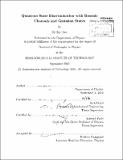Quantum state discrimination with bosonic channels and Gaussian states
Author(s)
Tan, Si Hui, Ph. D. Massachusetts Institute of Technology
DownloadFull printable version (7.657Mb)
Other Contributors
Massachusetts Institute of Technology. Department of Physics.
Advisor
Seth Lloyd and Edward Farhi.
Terms of use
Metadata
Show full item recordAbstract
Discriminating between quantum states is an indispensable part of quantum information theory. This thesis investigates state discrimination of continuous quantum variables, focusing on bosonic communication channels and Gaussian states. The specific state discrimination problems studied are (a) quantum illumination and (b) optimal measurements for decoding bosonic channels. Quantum illumination is a technique for detection and imaging which uses entanglement between a probe and an ancilla to enhance sensitivity. I shall show how entanglement can help with the discrimination between two noisy and lossy bosonic channels, one in which a target reflects back a small part of the probe light, and the other in which all probe light is lost. This enhancement is obtained even though the channels are entanglement-breaking. The main result of this study is that, under optimum detection in the asymptotic limit of many detection trials, 6 dB of improvement in the error exponent can be achieved by using an entangled state as compared to a classical state. In the study of optimal measurements for decoding bosonic channels, I shall present an alternative measurement to the pretty-good measurement for attaining the classical capacity of the lossy bosonic channel given product coherent-state inputs. This new measurement has the feature that, at each step of the measurement, only projective measurements are needed. The measurement is a sequential one: the number of steps required is exponential in the code length, and the error rate of this measurement goes to zero in the limit of large code length. Although not physically practical in itself, this new measurement has a simple physical interpretation in terms of collective energy measurements, and may give rise to an implementation of an optimal measurement for lossy bosonic channels. The two problems studied in my thesis are examples of how state discrimination can be useful in solving problems by using quantum mechanical properties such as entanglement and entangling measurements.
Description
Thesis (Ph. D.)--Massachusetts Institute of Technology, Dept. of Physics, 2010. Cataloged from PDF version of thesis. Includes bibliographical references (p. 161-166).
Date issued
2010Department
Massachusetts Institute of Technology. Department of PhysicsPublisher
Massachusetts Institute of Technology
Keywords
Physics.